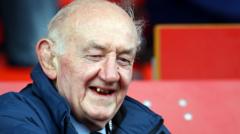Who Was Ray French, the Legendary Dual-Code International and Voice of Rugby League?

Ray French: The Voice of Rugby League Across Four Decades on the BBC
In the world of sports commentary, few voices resonate as deeply as that of Ray French. For millions who grew up in the television age of rugby league, French's voice became the soundtrack to the glory years of the sport during the 1980s and 1990s. His unique style and charming delivery made him a household name, synonymous with iconic rugby league moments. This article delves into his life, career, and the legacy he left behind, showcasing why Ray French is celebrated as a true legend in the realm of broadcasting and rugby league.
Early Life and Rugby Career
Ray French's journey began in St Helens, a town steeped in rugby history. Born into a working-class family, he displayed athletic prowess from a young age. His initial foray into rugby was on the union side, where he earned international honors, showcasing his talent and determination. French's transition from rugby union to league was a pivotal moment in his career, as he joined St Helens, where he quickly became a respected player. His on-field intelligence and robust playing style, particularly in the second-row position, made him a formidable presence in the sport.
During his playing career, French became part of a successful St Helens side, playing alongside legends like Kel Coslett and Tom van Vollenhoven. His tenure at St Helens was marked by significant achievements, including winning several championships. Eventually, he ended his playing career at Widnes, but his impact on the game did not cease as he transitioned into the world of broadcasting.
A New Chapter: Broadcasting Career
Ray French made his mark as a broadcaster in a period when rugby league was gaining traction on national television. His first Challenge Cup final commentary in 1982 marked the beginning of a long and illustrious career with the BBC. French's unique ability to convey the excitement of the game, coupled with his rich vocabulary and engaging tone, set him apart from his contemporaries. Following in the footsteps of Eddie Waring, who had laid the groundwork for rugby league commentary, French brought his own flair to the microphone.
French's commentary was characterized by its emotive language and vivid imagery. He had a knack for capturing the essence of crucial moments in games, providing a narrative that brought viewers to the edge of their seats. His famous catchphrase, "He's going for the line!", became a staple in rugby league commentary, embodying the thrill of the sport. French successfully bridged the gap between the game and its audience, making rugby league accessible and exciting for viewers across the nation.
Memorable Moments in Commentary
Throughout his career, Ray French had the privilege of commentating on some of the most memorable matches in rugby league history. One standout moment was the 1985 Challenge Cup final between Wigan and Hull, often regarded as the ultimate showdown. French's exuberant call of John Ferguson's try showcased his ability to elevate the drama of the game. "He can step on a threepenny bit this lad!" became a celebrated line, encapsulating the artistry of the player and the excitement of the moment.
Another iconic moment was Jonathan Davies's stunning try against Australia in 1994, where French's commentary captured the essence of the match. "He's got the head back! The Welshman is in for a magnificent try," became a phrase etched in the memories of fans. Perhaps the pinnacle of French's commentary came during Martin Offiah's legendary length-of-the-field try in the 1994 Challenge Cup final against Leeds. "That must rank among the finest ever seen on this ground," he proclaimed, perfectly summing up the magnitude of the moment.
The Art of Commentary
What made Ray French's commentary so special was not just his ability to describe the action but his profound understanding of the game. His background as a player gave him unique insights into the strategies and skills required to excel in rugby league. French's commentary was infused with passion, and he had a remarkable way of connecting with both players and fans. His rapport with co-commentators, including former teammates like Alex Murphy, added depth to his broadcasts, making them more engaging and enjoyable for viewers.
French's commentary style was also characterized by his playful use of language. He had a penchant for combining a player's weight with their amateur club, creating a sense of familiarity and warmth. This idiosyncrasy endeared him to fans, who appreciated his authentic approach to broadcasting. His sing-song voice and rich vocabulary breathed life into the games he covered, effectively turning every match into a spectacle.
Legacy Beyond Broadcasting
Ray French's influence extended beyond the realm of commentary. He was not only a beloved broadcaster but also a respected figure in the rugby community. Those who worked with him often described him as a genuinely kind and humble individual. Whether speaking with players, coaches, or fans, French's warmth and approachability left a lasting impression. Despite his fame, he never lost sight of his roots or the values that shaped him as a person.
In his later years, French continued to share his passion for rugby league, lending his voice to Radio Merseyside alongside close friend Allan Rooney. Their broadcasts were filled with anecdotes, stories, and a genuine love for the game, reminiscent of the classic commentary that fans cherished. It was this dedication to the sport and its community that solidified Ray French's status as rugby league royalty.
Reflecting on a Life Well-Lived
Ray French's impact on rugby league and broadcasting is immeasurable. His ability to connect with audiences, combined with his deep understanding of the game, made him a beloved figure for generations of fans. From his early days as a player to his illustrious career as a commentator, French's journey was marked by passion, dedication, and a genuine love for rugby league.
As we remember Ray French, we celebrate not only his contributions to rugby league but also the values he embodied. His humility, kindness, and respect for the sport serve as a reminder of the importance of character in the world of sports. Ray French will forever be remembered as a broadcasting legend and an enduring symbol of rugby league's rich history.
Frequently Asked Questions
What made Ray French an iconic voice in rugby league commentary?
Ray French's unique style, emotive language, and deep understanding of the game set him apart as an iconic voice. His ability to capture the excitement of key moments and connect with audiences made his commentary unforgettable.
How did Ray French's playing career influence his commentary style?
French's background as a player gave him valuable insights into the strategies and skills required to excel in rugby league. This understanding allowed him to provide more nuanced and engaging commentary, enhancing the viewer's experience.
What are some of Ray French's most memorable commentary moments?
Some of French's most memorable moments include his calls during the 1985 Challenge Cup final between Wigan and Hull, Jonathan Davies's try against Australia, and Martin Offiah's legendary length-of-the-field try in the 1994 Challenge Cup final.
How did Ray French maintain his connection to rugby league in his later years?
In his later years, French continued to commentate on rugby league games for Radio Merseyside, sharing stories and anecdotes alongside friend Allan Rooney, showcasing his enduring passion for the sport.
Ray French's legacy as a rugby league broadcaster is firmly established, and his contributions will continue to resonate for years to come. As we reflect on his life, it's essential to consider how his passion and dedication to the sport have shaped the way we experience rugby league today. What aspects of Ray French's commentary do you think will be most remembered by fans? #RayFrench #RugbyLeague #BroadcastingLegend
Published: 2025-07-26 17:24:08 | Category: sport



